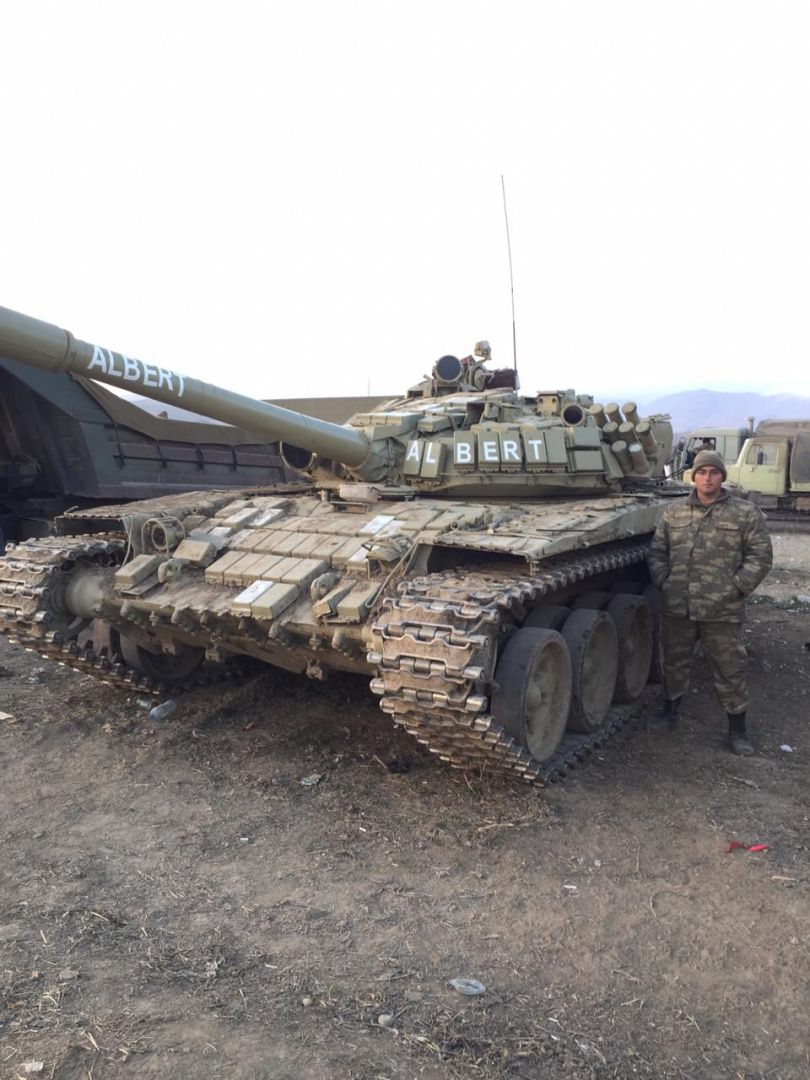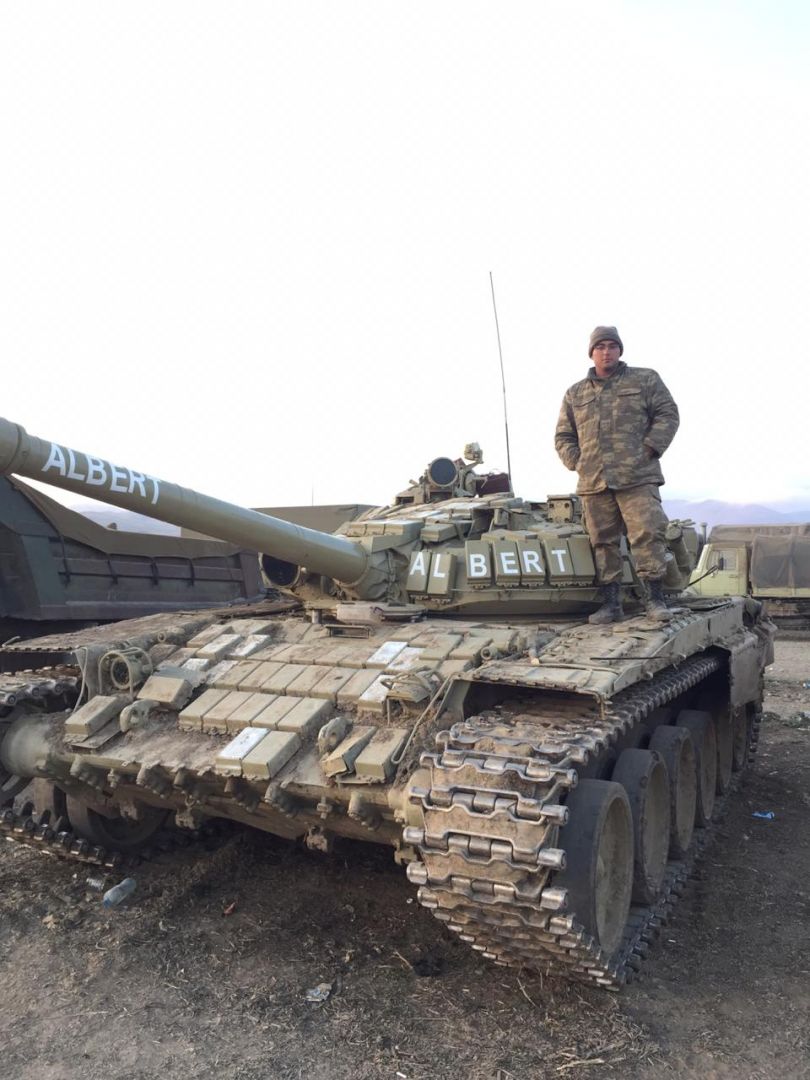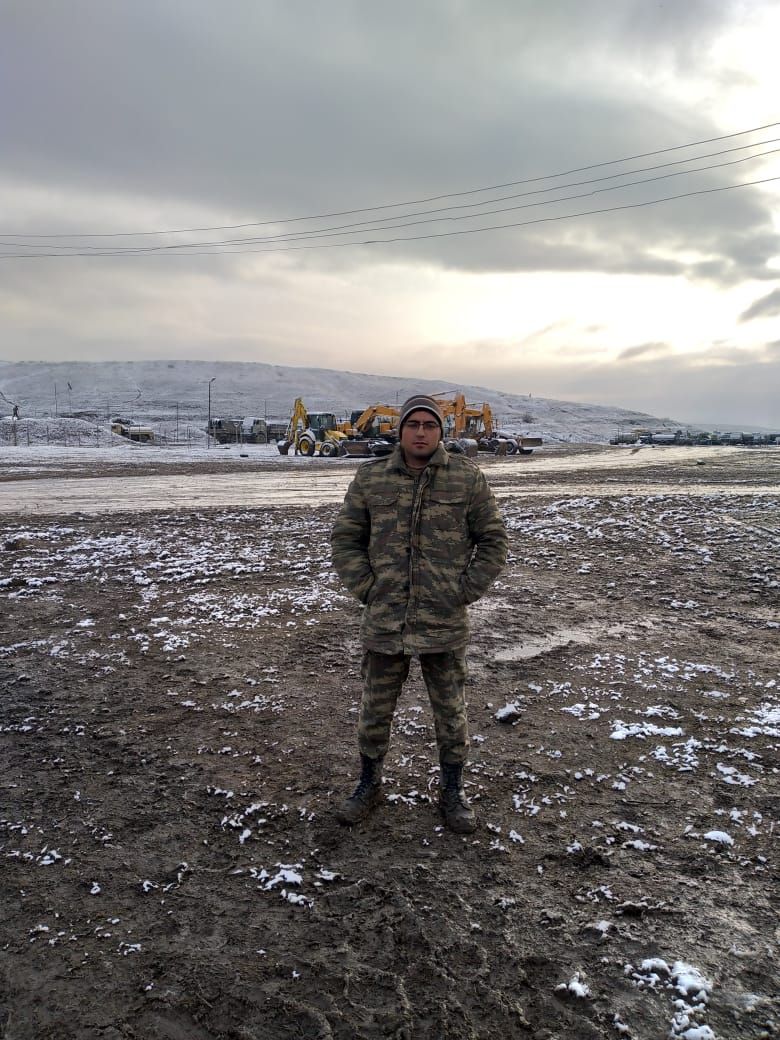Interview with Second Karabakh War Veteran on determination, comradery, Armenia's dirty tricks [PHOTO]
![Interview with Second Karabakh War Veteran on determination, comradery, Armenia's dirty tricks [PHOTO]](https://www.azernews.az/media/2022/09/29/whatsapp_image_2022-09-27_at_145231_1.jpg)
By Sabina Mammadli
Baku is once again decorated with blue, red, and green colors - the sight of tricolor flags flattering on a multitude of buildings.
On September 27, the country commemorated the second anniversary of the start of the 44-day second Karabakh war. The memory of the second Karabakh war martyrs, who heroically fought for the liberation of their historical lands to end the cruel occupation, was honored popularly. The overwhelming feeling of unity, sorrow, and grief for the lives lost is mixed with happiness, and pride, brought by the ultimate victory.
Here, at Azernews’ newsroom, at noon, we stood together with the whole nation for a minute of silence in the name of the martyrs.
It is very fitting that on a day of such significance, I had a chance to interview a Second Karabakh war veteran, a family friend, Zeynal Axundov, who heroically fought in the Fuzuli and Khojavand directions. Zeynal is my cousin’s childhood friend; his mother taught Russian language and literature to all of us; we marked many celebrations together as children. It is even more symbolic to have him in the newsroom on a much more significant day.
After expressing gratitude for his consent to be interviewed, as well as for the selfless fight of our armed forces and each and every soldier and officer, who brought the long-awaited day, we moved to the Q&A.
Q. Please, tell us when and how did you find yourself in the war? What did you feel at that moment?
A. I was at work. At first, they just called me and said that they were putting us on some lists. I gave my information; let them know my current address. On the same day after work, I was called to the housing office, where I signed the documents. The next day I came to the military enlistment office and that was it. There were many questions. It was unexpected. The conflict has been going on for a long time; so I thought it would all end quickly. There was certainly some confusion at the start.
Q. Please, tell us about your combat mission
A. Well, we were told that the enemy had already taken aggressive actions; so we had no choice but to defend our territories, especially knowing that these territories are internationally recognized as Azerbaijani lands. We understood that we had a mission: we were going to defend our territories. We were absolutely not aggressive. We just came to return ancestral lands of our fathers and grandfathers. These are our lands, everyone understood this. Even the opposite side realized this and because of this, sometimes they simply fled the scene. They did not want to come into conflict with us, as they themselves understood that these were not their lands.
Q. Could you talk about the moral and psychological state of a soldier in the war, especially at the outset? What were you thinking of?
At first, it was scary. The opponents suffered heavy losses, and we had some losses, too. I previously served in the army, so I had the necessary training. But it is impossible to be fully prepared for war. And when you see that the people you have breakfast with die, it affects you badly. We understood that this was a war and that these were collateral losses. However, even when a soldier died, it affected us. But on the other hand, we wanted to return our lands even more then, because we became even more aware that all this had a purpose. We knew we were doing the right thing.
There was a moment when we entered a city, which was previously controlled by Armenians, so they knew very well about the location of the unit. There, we came under mortar fire. We were taught how to take cover, how to guess where the projectile would fall and what to do in this case, but, despite the fact that there were quite young soldiers among us, I noticed that everyone was filled with a fighting spirit. No one ran away, no one got lost, and everyone helped each other. I think this, among other things, helped us to return such a large territory in a short time. Those who were more experienced, and who had previously served, guided the less experienced soldiers. Thanks to mutual help and support, we were able to move further.
Q. What motivated you to move further?
We were motivated by the fact that we perfectly understood that if we gave up this territory, the enemy would not stop there. They could then go to our other areas under our complete control. And the enemy would understand that they remained completely unpunished and would continue their misdeeds. We knew that we were protecting our lands, our homes, and our next of kin.
There was also a lot of help from people. They brought us food, underwear, and hats. It was very nice. All this warmed us, both literally and morally. We understood that they love us, remember, that no one has forgotten us.
A week before the end of the war, we received letters from school children. We read them all together, and we were very pleased. They wrote that they love us and that they are proud of us. This greatly raised our spirits.
Q. What kind of attitude did you witness from the opposite side during the war?
A. I was an orderly. At certain moments, when there was a humanitarian truce so that we could pick up the wounded and the dead, they let in orderlies. It wasn’t allowed to shoot at them. When their orderlies were performing their tasks, our snipers did not shoot at them. On the contrary, they hunted us. When our staff took the wounded or the dead, they simply fired without warning, they did not comply with agreements. They even had such a tactic that they would shoot the orderlies in the leg, wait for someone to come to the rescue and after that, they would fire at us with mortar shells or other types of artillery.
At the same time, they were very cowardly. When we entered some areas, there was no one there. Apparently, they saw that we had a large army and that we were not retreating, despite their provocations, they simply ran away. In addition, they ran away simply because they subconsciously understood that these were not their territories; that we were fighting for our lands, but they were simply doing all this on someone's orders.
There was also a moment when we went into houses they occupied, they had food in the basements. They poisoned all the food. Soldiers from another unit informed us that all the food had been poisoned. There was a dog in the house, we tested the food on it and saw that the animal had died. They just poisoned all the food or left mines near the houses. I heard that they left mines for our soldiers to blow up on them even after the agreements.
Q. Can you narrate the most memorable episode from your days in the war? Maybe a certain day?
A. The final day. When we were told that we had won the war. We learned about it at night. We had a driver, he was a civilian, and he volunteered to go to the war. I think it was him, who turned on the radio. We all listened to the press conference. We rejoiced all night, we could not sleep. We realized that we have won the war and that we were able to regain our territories. We were filled with joy and pride. The joy for the fact that all this is over, that we managed to return the territories of our grandfathers, our lands. We were very glad that there would be no more losses on our part and excited to go back home. To be honest, the emotions were simply indescribable. Now as I am telling this as something ordinary, but at that time, there were simply indescribable emotions. We didn't sleep all night. We simply could not fall asleep, because, after all the losses and difficulties, we went through, we realized that all was not in vain. We were proud that we reached our goal.
And we were glad that the enemy finally realized that they were suffering very heavy losses. At first, the Armenians did not admit to their losses and were deceiving their own people. Then there were so many proofs of their heavy losses that they had to sign the documents. Although, for so many years, they were offered to sign a truce, to surrender the occupied territories. But they did not want to communicate, and what had to be done was done.
Q. What did you do immediately upon arrival in Baku?
A. We returned a month after Armenia surrendered, since they agreed in words, but troops were not withdrawn from all regions. For example, we had Fuzuli District, but in some villages illegal bandit formations, which even refused to obey the authorities in Armenia, still remained. They continued to shell our units. So we had to stay, as we were always expecting provocations until we were sent home.
It turned out that the money I had before and with which I went to war was still with me. I went to the store and bought a cake there. I came back home in my uniform. Mom was shocked because I hadn’t warned her. I wanted to surprise her. Everyone rejoiced and cried. All relatives, acquaintances, and friends immediately began to call. Everyone was happy and me too.
---
Sabina Mammadli is AzerNews’ staff journalist, follow her on Twitter: @SabinaMmdl
Follow us on Twitter @AzerNewsAz
Here we are to serve you with news right now. It does not cost much, but worth your attention.
Choose to support open, independent, quality journalism and subscribe on a monthly basis.
By subscribing to our online newspaper, you can have full digital access to all news, analysis, and much more.
You can also follow AzerNEWS on Twitter @AzerNewsAz or Facebook @AzerNewsNewspaper
Thank you!



